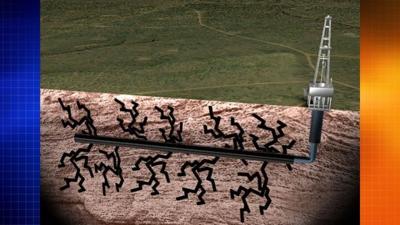ANNAPOLIS, Md. (AP) - Fracking opponents came out in force Tuesday to speak their minds at a Senate hearing on legislation that would limit natural gas drilling in Maryland.
After more than five hours of testimony on unrelated legislation, by 6:30 p.m. the Senate committee had only just begun hearing testimony on the two drilling bills_one that would place an eight-year moratorium on fracking and another to prohibit the practice.
Elliott Perfetti, operations manager of Blue Moon Rising, an "eco-friendly vacation village" in Garrett County, said his concern with fracking is that it "threatens the foundations that our economy and our community are built on."
"It is not compatible with what our unique socio-economic landscape is," said the 30-year-old, who was born and raised in Garrett County. "We're not Pennsylvania, we're not West Virginia. We are different than those places. Tourism is our business, it is the brand of Garrett County whether people want it to be that or not."
Fracking is a drilling method by which highly pressurized water, sand and chemicals are pumped into the ground, shaking loose rocks and releasing gas. In 2011, former Gov. Martin O'Malley charged an advisory commission with studying the potential for fracking in Maryland's western Washington, Allegany and Garrett counties.
Currently Maryland does not have any fracking, but a portion of the western side of the state sits atop the Marcellus Shale deposit, which runs underground from New York to Tennessee. West Virginia and Pennsylvania allow fracking, while New York recently banned the practice due to health concerns.
At least two members have spoken out against the commission's nearly four years of work, criticizing the lack of attention to potential risks to public health.
Katharine Dubansky, owner of the 106-acre organic Backbone Food Farm in Garrett County, said she worries about the health of her children and her livestock should fracking come to her back yard.
"I would like to remain on my farm and have it be viable," said Dubansky, 42. "I feel like if fracking comes to our neighborhood ... we will no longer be able to stay there because it would be very unhealthy. I don't feel like I'd have the integrity to be able to feel good about my product that I was selling."
But William Valentine, president of the Alleghany County Commissioners, and member of the governor's advisory commission, defended the group's work and sought to ally health concerns.
Valentine said the regulations proposed by the commission would already limit fracking to about 10 percent of the state.
"Our commission was run by the Maryland Department of the Environment and DNR," Valentine said. "They really wanted to prove, I think, it could not be done safely. The facts just weren't there to support that."
"Pick up the phone and call the state of Pennsylvania's health department and say 'what have you seen,'" Valentine said. "I've made that call. They have not seen contaminated water; they have not seen any health crisis. Pick up the phone and call West Virginia, pick up the phone and call Ohio. I think Texas has been rather well known for doing this stuff for decades; they haven't been removed from the map."
Del. Wendell Beitzel, R-Garrett County, said he supports the drilling for its economic benefits to the area, though he admitted there was "no question we need to regulate the industry."
But opponents' fears and call for additional regulations, he said, are tantamount to putting an invisible sign on the state's border that says "gas companies are not welcome."







